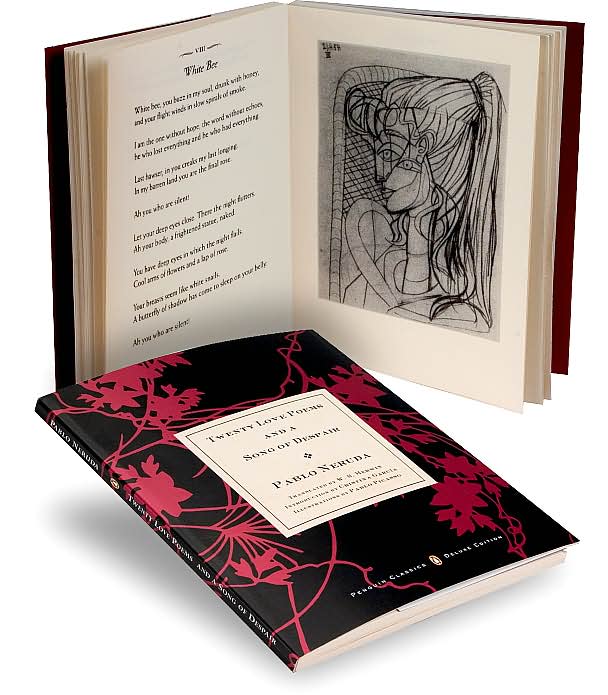 It being in the news, and April being National Poetry Month, I thought a post about one of Neruda's best-known and best-loved works, Twenty Love Poems and a Song of Despair was in order.
It being in the news, and April being National Poetry Month, I thought a post about one of Neruda's best-known and best-loved works, Twenty Love Poems and a Song of Despair was in order.The copy I own is pictured to the right. It's a small book with an artisanal feel to it because of the really nice paper that forms its cover (with French flaps, for those of you who understand the term - or with big folded-in flaps for those who don't) and rough-cut edges on the pages inside. Each poem is presented in the original Spanish text facing a translation by W.S. Merwin, and the book is interspersed with illustrations by Pablo Picasso.
This collection of poems was written when Neruda was a very young man - high-school aged, really, since they were published in 1924, when he was only 19. The poems are astonishing in their imagery and sensuality. Here is just a snippet of the translation of number fourteen, "Every Day You Play":
Every day you play with the light of the universe.
Subtle visitor, you arrive in the flower and the water.
You are more that this white head that I hold tightly
as a cluster of fruit, every day, between my hands.
You are like nobody since I love you.
Let me spread you out among the yellow garlands.
Who writes your name in letters of smoke among the stars of the south?
Oh let me remember you as you were before you existed.
You can read the rest here, but the poem closes with "I want to do with you/what spring does with the cherry trees." *swoon*
The twentieth love poem is one that speaks of loss: "Tonight I Can Write". It begins:
Tonight I can write the saddest lines.You can read the rest here. Although a poem of loss, it is still one that Neruda labeled as a love poem, despite it having very much in common tonally (and in subject matter) with the last poem in the collection, "A Song of Despair".
Write, for example, "The night is starry
and the stars are blue and shiver in the distance."
The night wind revolves in the sky and sings.
Tonight I can write the saddest lines.
I loved her, and sometimes she loved me too.
Through nights like this one I held her in my arms.
I kissed her again and again under the endless sky.
She loved me, sometimes I loved her too.
How could one not have loved her great still eyes.
Tonight I can write the saddest lines.
To think that I do not have her. To feel that I have lost her.
If you are interested in poetry, and particularly in the fine craftmanship of poetry, this collection is for you. It's also a real treasure for those who speak or study Spanish, since nearly all collections of the poems (and all the good ones) print both the original Spanish of the poems and the English translation are available, so that you can read them as Neruda wrote them, translate them for yourself, or read them as someone else (in the case of my book, W.S. Merwin) has translated them.

2 comments :
I found this book when I was about 19. I had no idea Neruda was so young when he wrote it. So good.
He was already so accomplished at an age most of us are still figuring out how to make sense!
Post a Comment